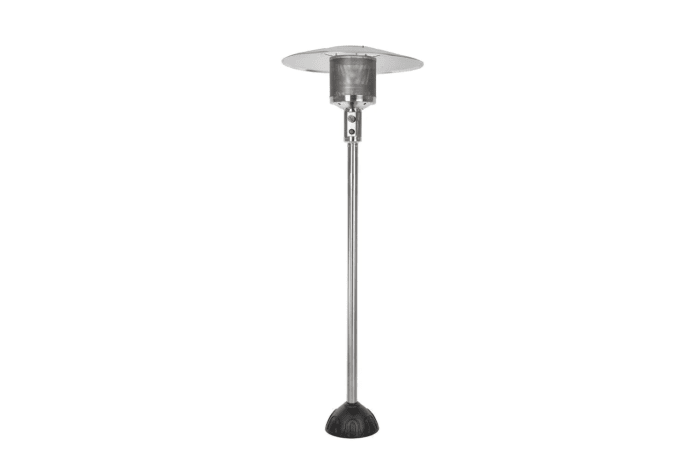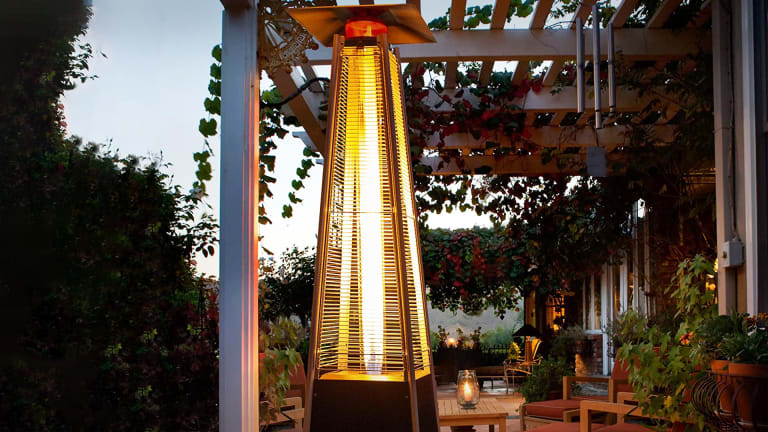Homeowners have begun expanding their living space into the backyard through large, inviting patios complete with outdoor kitchens and dining areas. These are real investments into the home and can provide terrific spaces for entertaining, so it makes sense to weatherproof those areas so they can be enjoyed year-round.
One way to ensure families and guests stay warm in the winter months while still enjoying the great outdoors is to use patio heaters that operate by radiating warmth within a set radius of the heaters.
But choosing the right patio heater for your environment is crucial, both to heat your space efficiently and for safety reasons. Not all patio heaters are suitable for all spaces, so we’ve put together a reference guide for the best patio heaters for every home.
Choosing a patio heater by area size
No matter which type of heater you choose, your purchase of the patio heater should take into consideration the size of the area you need heated. Look for the BTUs (British Thermal Units) listed on the patio heater. The larger the BTUs, the wider the radiant heat travels. There are a few ways to calculate how many BTUs you need in your space; however, we can save you the time and math, and tell you the average 20x20 patio needs around 84,000 BTUs, which is equivalent to two large propane heaters.
Best natural gas patio heaters
These rather large — and fairly permanent — structures are much more expensive in the initial purchase than some other heaters, but by connecting to your home’s gas line, they save money in the long run. There are no propane tanks to refill, which can get expensive over time. And because they are running off the main gas line, they won’t run out of heat. The typical propane heater lasts only about 10 hours at most.
- Pros: The natural gas-powered patio heaters have an endless supply of heat, as the natural gas line won’t run out. They are also less expensive to operate in the long run, averaging around $.47 per hour to operate.
- Cons: These patio heaters are expensive at the initial purchase, running around $1500 for an average model. They require professional installation and are not portable.
Our Pick: Stainless Steel Natural Gas Patio Heater
These stainless-steel beauties emit a lot of heat, look good, and are relatively cost-effective for a permanent natural gas patio heater. Made for the serious outdoor entertainer, the Fire Sense heater connects to your home’s natural gas line and has a heavy-duty mounting plate that keeps the heater from tipping over, even in strong winds. It assembles easily and has an easy-to-use quick-start ignition.
45,000 BTU Stainless Steel Natural Gas Patio Heater ($292.08; homedepot.com)
Fire Sense 61445 Natural Gas Patio Heater, Stainless Steel ($258.99; amazon.com)

Stainless Steel Natural Gas Patio Heater at Amazon and The Home Depot.
The Home Depot
Our Pick: Sunglo Stainless Steel Portable Natural Gas Heater
Typically available through serious patio furniture stores, this is the King of all-natural gas heaters. With 50,000 BTUs, it radiates heat up to 18 feet away from the base, has an easy ignition to start, and a sleek stainless steel finish. It’s a commercial-grade heater made for the serious outdoor entertainer.
Sunglo Stainless Steel Portable Natural Gas Heater ($1,986; patioliving.com)
Best propane patio heaters
If you’ve been seated outdoors at a restaurant, you’ve probably enjoyed the radiant heat from a portable propane heater. They’re affordable for home use, and are great for larger, outdoor spaces. These patio heaters are run off of a replaceable propane tank, and while they’re heavy, they usually come on wheels and are fairly easy to move around a patio or deck. They are easy to assemble and use right away, as long as your propane tank is full.
- Pros: Propane tank patio heaters are very easy to assemble and they are relatively inexpensive at the initial purchase. While not particularly lightweight, most come with wheels and are relatively easy to move around the patio or outdoor living space.
- Cons: A 20-gallon propane tank will run anywhere from 9-15 hours before running out of gas. The patio heaters are large and a little bulky, and not suitable for use in enclosed spaces. In addition, they cost around $1.60 per hour to operate.
Our Pick: 46,000 BTU Gas Patio Heater
The makers at Fire Sense claim this heater is one of the most powerful on the market, and we’d have to agree — at 46,000 BTU, it’s more powerful than the average at 40k BTUs. It’s quick to ignite and has a tip-over protection system, which is key if you have smaller people around. The 20-gallon propane tank is not included, but easy to find wherever BBQ supplies are sold. With a powder-coated exterior and a stainless-steel heat cage, this patio heater is built to last.
46,000 BTU Aged Chestnut Gas Patio Heater ($232.27; homedepot.com)
Golden Flame 46,000 BTU (XL-Series) ($179.88; amazon.com)
Our Pick: 42,000 BTU Residential Patio Heater
This heater might not pack as much punch in the BTU department as the Fire Sense heater, but its stylish design, adjustable heat level, and tempered glass tube that contains the flame makes it a real looker among other patio heaters. The pyramid design is a stainless steel composite with aluminum finish, which helps heat spread quickly. It’s easy to set up, inexpensive to use, and makes a big impression on your guests.
42,000 BTU Residential Black Propane Heater with Cover ($299.00, homedepot.com)
Pamapic Patio Heater, 42,000 BTU Pyramid ($309.99; amazon.com)
Best electric patio heater
If you have a small space that’s mostly enclosed, you’ll want to look at an electric patio heater. Since propane or gas heaters should not be operated inside or on screened-in spaces, because the gas fumes can accumulate, any sunrooms, enclosed patios, or screened-in porches should use electric patio heaters. Most electric heaters give off infrared heat, are energy efficient, and safe to use. However, they can often require higher voltage than the standard electrical outlet and may require an electrician to install. There are also halogen heaters that use halogen bulbs that are heated by an electric current. These provide a lot of heat, but the heater itself remains cool to the touch, making it safe for children and pets.
- Pros: These electric heaters can hang from the ceiling or be tabletop and come in a wide variety of sizes. They run on electricity, so if you don’t have gas they are a nice option. They are also safe to operate in an enclosed space.
- Cons: These electric patio heaters may need professional installation, as some require outlets with 240
Our Pick: Indoor/Outdoor Plastic Electric Heater with Adjustable Thermostat
This small-but-mighty heater from Comfort Zone heats quickly and has three different settings to handle all your inclement weather needs. This heater can be wall mounted or mounted on a stand (sold separately), it’s easy to install and provides quite a bit of heat for its size. And as a bonus, it uses a standard electrical outlet, so doesn’t need professional installation.
1,500-Watt Indoor/Outdoor Stainless Steel Electric Patio Heater ($67.50; homedepot.com)
Comfort Zone CZPH20R Outdoor and Indoor Patio Heater ($79.99; amazon.com)
Our Pick: Electric Carbon Infrared Space Heater
This bad boy of the electric heater game can be used indoors or outdoors and mounted on the wall or ceiling. Using carbon infrared heat, it warms up instantly and has three different temperature settings. Buyers love installing in their garage workshops as well as on the patio, and like the Comfort Zone, it uses a standard household electric outlet.
1500-Watt Electric Carbon Infrared Space Heater ($118.99; homedepot.com)
Dr Infrared Heater DR-238 Carbon Infrared Outdoor Heater ($91; amazon.com)
No matter which one you choose, adding a patio heater can keep you entertaining your guests outdoors all year round. A quick note: all portable outdoor heaters should be covered and stored upright when not in use, especially during inclement weather.
Maven Media Brands, LLC and respective content providers to this website may receive compensation for some links to products and services on this website.
Prices are accurate and items in stock at time of publishing.











